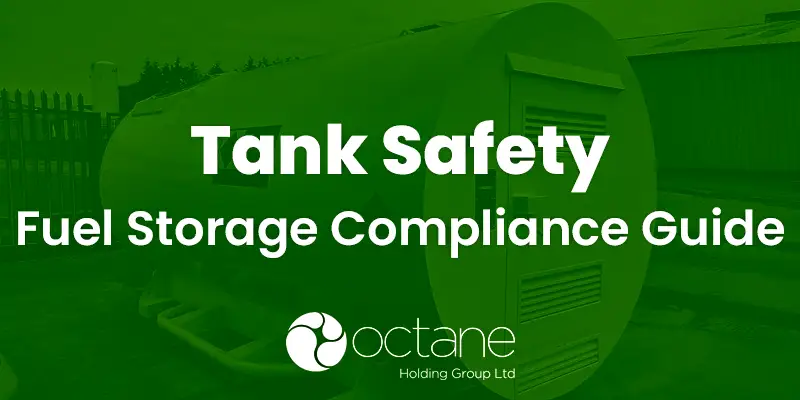Latest News
Keep up to date with latest news and insights from Octane Holdings

Fuel Storage Tank Safety Guidelines: Are You Compliant?
When storing fuel commercially, safe storage is absolutely essential. A bunded fuel tank offers secure storage with the outer bund tank providing an additional layer of protection to the inner tank containing fuel. But as reliable and safe as these tanks are – they are not impervious to neglect.
Regular tank inspections and maintenance are essential to you and your site’s safety. To help make sure your site is safe the Environment Agency has a set of guidelines which must be followed.
[blockquote author=”Environment Agency”]You could face a fine, prosecution or civil penalties if you don’t follow the requirements on this page. The Environment Agency can also serve an anti-pollution works notice to make you bring your store up to legal standards.[/blockquote]
Quote taken from the Environment Agency guidelines on Storing Oil at a Home or Business
All on site fuel tanks should be inspected regularly to ensure they are free from leaks and that any repair work or welding done is still functional. Therefore your tank is still suitable and safe for storing fuel on-site.
Ongoing monitoring
While an annual tank inspection can give you a certain level of reassurance, it’s important you have your own regular monitoring scheduled to check for leaks and damage.
Good fuel management is an important part of leak detection. Know your fuel levels and track usage. If you spot any unexplained drop in fuel levels, it could indicate a potential leak. If you suspect this may be the case, it is important to contact a professional immediately. Octane’s engineers are available for emergency call-outs 24 hours a day.
Secondly, it is important to schedule regular fuel tank inspections – including the tank, piping and surrounding area. Watch out for any:
- Obvious leaks or damage
- Obvious leaks or damage
- Corrosion, rust or cracks
- Corrosion, rust or cracks
- Warping or deformities
- Warping or deformities
- Vents and Gauges that are not sealed off from water and debris
- Vents and Gauges that are not sealed off from water and debris
- Changes to the supporting structure or base
Extra severe weather checks

Extra maintenance checks should be carried out after any periods of adverse weather conditions, such as the heavy rain and flooding experienced recently. The storms and heavy flooding may have destabilised the ground beneath your tank, and all supporting structures and bases should be carefully inspected.
A bunded tank is required to be able to contain 110% of the capacity of the tank, to allow it contain any spillages. After the recent heavy rains and floods, it is essential to check your bund for water and debris. If any water has seeped into the bund, the bund will have lost the space to contain all the fuel in the event of a leak of the inner tank.
Preparing for the worst
While a good site risk assessment and maintenance strategy will help avoid any emergency – it is also important to prepare for the worst. Devising an Emergency Response Plan for your business is essential and should:
- Define what constitutes an emergency on-site and identify the different types of potential emergency scenarios
- Identify all emergency response equipment on site and schedule regular inspections of same
- Create a detailed site map that clearly marks the location of all tanks, pumps, dangerous goods and emergency exit route
- Detail your specific emergency response steps to different scenarios, including evacuation procedures
- Ensure all staff are adequately briefed and trained on the procedures, and all roles and responsibilities in the case of an emergency are clearly defined.
- Define what constitutes an emergency on-site and identify the different types of potential emergency scenarios
These plans should be regularly updated, staff should be frequently trained, and practice drills should be carried out to test these emergency response procedures.
How can I make sure we’re compliant?
Octane offer service & maintenance contracts that cover visits to your site twice a year. During these visits, we carry out a full site risk assessment and tank inspection to ensure you meet all current regulations and make sure everything is in place should something happen.
Also, all fuel pumps and filters are cleaned which not only provides you with peace of mind your site is safe and compliant, but helps prolong the life of your equipment and avoid expensive replacement bills in the future.

